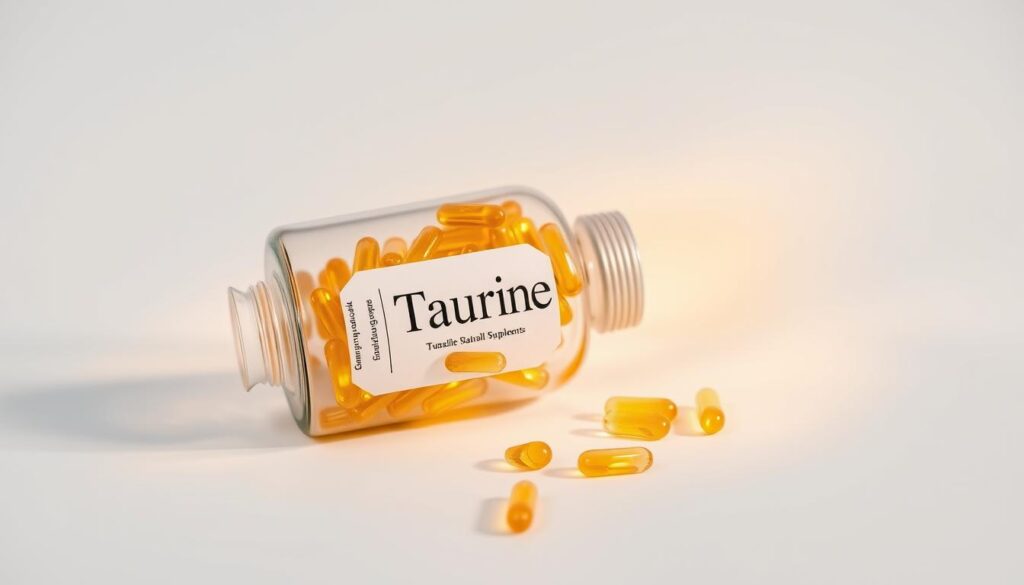You might not know about taurine, but it’s key for your health. It’s found in the heart, muscles, and brain. It helps with heart health and muscle function.
Learning about taurine can change your wellness game. Taking supplements can boost your health in many ways.
Discovering taurine and its benefits can lead to a healthier life. This article will explore its uses and advantages. It aims to help you make better health choices.
Table of Contents
What Is Taurine? Understanding This Essential Amino Acid
Taurine is an amino acid found in many foods and made by our bodies. It’s key for staying healthy. While our bodies can make it, sometimes we need to eat more or take supplements to get enough.
The Science Behind Taurine
Taurine helps in many ways. It acts as an antioxidant, protecting cells from damage. Studies show it’s good for the heart, helping the heart and muscles work right.
How Taurine Functions in Your Body
Taurine is important for many body functions. It helps muscles, eyes, brain, and heart work well. It also helps digest fats by making bile salts. Plus, it helps with exercise, reducing muscle damage and boosting endurance.
Knowing how taurine works helps us see its value for health. Getting enough taurine, through food or supplements, is vital for our body’s functions.
The Remarkable Health Benefits of Taurine
Taurine is an essential amino acid that plays a key role in keeping us healthy. It benefits our heart, brain, and muscles. This makes taurine a valuable nutrient for many bodily functions.
Cardiovascular Health Support
Taurine helps keep our heart healthy by controlling blood pressure and improving heart function. It can lower the risk of heart disease by improving our lipid profiles and reducing inflammation. This makes taurine crucial for a healthy heart.
Brain Function and Neurological Benefits
Taurine supports brain health, potentially improving our cognitive function and reducing the risk of neurodegenerative diseases. Its antioxidant properties protect our brain from oxidative stress. This supports overall brain health. Taurine also helps with energy production in the brain, keeping us mentally sharp.
Muscle Performance and Recovery
For athletes, taurine boosts muscle performance and aids in recovery. It reduces muscle damage and inflammation after exercise, leading to faster recovery times. This makes taurine a favorite among athletes looking to improve their performance and reduce downtime.
Metabolic and Antioxidant Properties
Taurine’s antioxidant properties protect against oxidative stress, which can harm cells and lead to diseases. It also supports our body’s natural detoxification processes. While often linked to taurine in energy drinks, its benefits go beyond just energy boosting, supporting our metabolic health.
In conclusion, taurine offers many health benefits, supporting our heart, brain, muscles, and metabolism. Adding taurine to your wellness routine can significantly improve your overall health and well-being.
Natural Sources of Taurine in Your Diet
Boosting your taurine intake is easy with the right diet. Taurine is mainly found in animal products. But, there are plant-based options for vegetarians and vegans too.
Animal-Based Taurine Sources
Animal products are the best sources of taurine. Meat, fish, and dairy are especially rich in it. For example, shellfish and dark meat from poultry have lots of taurine.
If you eat animal products, adding these foods to your diet can help keep taurine levels up.
Plant-Based Alternatives
Plant-based diets can also get enough taurine. Seaweed is a great plant-based source. Some algae and seaweed have a lot of taurine, making them good for vegetarians and vegans.
Foods Highest in Taurine Content
Here’s a list of foods with lots of taurine:
| Food | Taurine Content (mg per serving) |
|---|---|
| Scallops | 827 mg |
| Clams | 652 mg |
| Duck Meat | 182 mg |
| Seaweed (varies by type) | Up to 1000 mg |
Eating these foods can help you meet your taurine needs. Whether you choose animal products or plant-based options, there are many ways to get enough taurine.
Taurine Supplements: Types and Selection Guide
Choosing the right taurine supplement is important. There are many types available, each meeting different needs. Knowing the differences helps you make a good choice.
Different Supplement Formulations
Taurine supplements come in capsules, powders, and liquids. Capsules are easy to use and dose. Powders let you adjust your dose and mix into drinks. Liquids are quickly absorbed by the body.
Think about your lifestyle when picking a type. If capsules are hard to swallow, powders or liquids might be better.
How to Choose Quality Taurine Supplements
It’s important to pick a high-quality taurine supplement. Look for products from trusted makers who follow Good Manufacturing Practices (GMPs). Also, check for third-party tests and certifications to ensure the product’s quality.
- Check the label for the amount of taurine per serving.
- Ensure the product is free from unnecessary additives and fillers.
- Consider products with additional ingredients that complement taurine’s benefits.
Combining Taurine with Other Supplements
Taurine works well with other supplements. Mixing it with creatine can boost muscle performance and recovery. Taurine and caffeine can increase energy and focus.
But, always talk to a healthcare expert before mixing supplements. This is to avoid any bad interactions.

Proper Taurine Dosage and Administration
To get the most from taurine, knowing the right dosage and how to take it is key. It can help with overall health or specific issues. Tailoring taurine to your health goals is important.
Recommended Daily Intake
The daily taurine intake varies by age, health, and goals. For general wellness, 500 mg to 2 grams daily is often enough. This amount supports health without too much taurine.
People on vegetarian or vegan diets might not get enough taurine. Supplements can help fill this gap.
Therapeutic Dosages for Specific Conditions
For certain health issues, more taurine might be needed. For heart health and exercise, 3 to 6 grams daily might be beneficial. Studies suggest these doses can be effective for some conditions.
Before taking high doses, talk to a doctor. They can help avoid taurine side effects and ensure it’s right for you.
Optimal Timing for Supplementation
When you take taurine matters. Athletes might see better performance and less muscle damage by taking it 30 minutes to 1 hour before exercise. For general health, taurine can be taken anytime, but be consistent.
For the best results, stick to a daily routine. Pay attention to how your body reacts to taurine.
Taurine and Energy: The Science Explained
Taurine is often linked to energy drinks, but its real impact is more complex. It’s a key ingredient in many energy-boosting products. Yet, to truly grasp its effect on energy, we need to dive into the science.
How Taurine Affects Energy Production
Taurine is vital for many bodily functions that help make energy. It aids in making bile salts, regulates calcium in the heart, and acts as an antioxidant. Taurine’s main role in energy production is in the mitochondria. It helps manage the electron transport chain, which affects ATP creation.
Taurine in Energy Drinks: Facts vs. Myths
Taurine in energy drinks is often seen as a way to boost energy. But, its real effect on energy levels is often overstated.
Common Misconceptions
Many think taurine directly boosts energy. But, it mainly supports heart health and might enhance athletic performance. It doesn’t give a direct energy lift.
Scientific Evidence
Research on taurine’s impact on energy and exercise performance is mixed. Some studies suggest it can improve muscle function and delay fatigue. Yet, other research finds no clear benefits to energy levels.
Athletic Performance and Endurance Benefits
Taurine has been explored for its potential to enhance athletic performance. It may reduce oxidative stress and muscle damage, which could improve endurance. Athletes use taurine supplements to gain an edge, but more research is needed to confirm its benefits.
Taurine for Cats: An Essential Nutrient
Cats need taurine to keep their hearts and eyes healthy. Taurine is an amino acid that cats can’t make enough of. So, they must get it from their food or supplements.
Why Cats Need Taurine
Taurine is key for your cat’s heart, eyes, and overall health. It helps with muscle work and the nervous system. Without enough taurine, cats can get very sick.
Key functions of taurine in cats include:
- Supporting heart health by maintaining cardiac function
- Preserving vision and preventing retinal degeneration
- Aiding in the development and function of the nervous system
Taurine Deficiency Symptoms in Cats
It’s important to know the signs of taurine deficiency. Look out for:
| Symptom | Description |
|---|---|
| Cardiac Issues | Heart failure, dilated cardiomyopathy |
| Vision Problems | Retinal degeneration, blindness |
| Reproductive Issues | Birth defects, reproductive failure |
If you see these signs, talk to your vet about taurine supplements.
Supplementing Taurine in Your Cat’s Diet
If your cat’s food lacks taurine, supplements can help. Always check with your vet before adding supplements. They’ll tell you the right amount and type.
When picking a taurine supplement, think about:
- Quality of the supplement
- Recommended dosage by the manufacturer or veterinarian
- Your cat’s specific health needs and conditions
Potential Side Effects and Safety Considerations
Taurine is usually safe, but knowing its side effects is key. It helps with many health issues. But, it’s important to know how safe it is to use it right.
Common Side Effects
Most people can take taurine without problems. But, some might feel a bit sick or have stomach pain. If you feel bad, try taking less or talk to a doctor.
Drug Interactions and Contraindications
Taurine might not mix well with some medicines. This includes blood thinners and diabetes drugs. Always check with your doctor before taking taurine, especially if you’re on meds or have health issues.
Special Populations: Pregnancy, Children, and Elderly
Women who are pregnant or breastfeeding, kids, and older folks should be careful with taurine. It’s safe in breast milk and during pregnancy, but we don’t know much about extra taurine. Always talk to a doctor before taking it.
| Population | Considerations |
|---|---|
| Pregnant Women | Consult healthcare provider before supplementing |
| Children | Dosage should be determined by a healthcare professional |
| Elderly | Monitor for potential drug interactions |

Conclusion: Integrating Taurine into Your Wellness Routine
You now know how taurine helps your heart and boosts sports performance. Adding taurine to your diet can make you feel better. You can get it from animal foods or supplements.
Choosing the right taurine supplement is important. Look at the ingredients, quality, and how it might affect other medicines. The amount you need can change based on your health.
Taurine is good for humans and cats alike. It keeps your cat healthy and prevents serious problems. Knowing how taurine works helps you take care of yourself and your pets.
Adding taurine to your routine is easy and can help you reach your health goals. It’s safe and has many benefits, making it a great choice for your daily routine.
FAQ
What is taurine, and why is it important for my health?
Taurine is a special amino acid that helps with heart health, muscle function, and fighting off free radicals. It’s key for staying healthy. Sometimes, you might need to take supplements or eat foods rich in taurine.
What are the benefits of taking taurine supplements?
Supplements can boost heart health, brain function, and muscle strength. They also help with recovery. Plus, they protect against damage caused by free radicals.
Where can I find taurine in my diet?
You can find taurine in seafood, meat, and dairy. For those who don’t eat meat, seaweed is a good option. If you can’t get enough, consider supplements.
How do I choose a high-quality taurine supplement?
Look for purity, potency, and the company’s reputation. Choose products from trusted brands that have been tested by third parties.
What is the recommended dosage of taurine?
Dosage depends on your health goals and needs. For general health, a standard amount is often suggested. But, for specific health issues, you might need more.
Can taurine improve my energy levels and athletic performance?
Yes, taurine helps with energy and can improve sports performance and endurance. It’s also found in energy drinks to boost energy.
Why is taurine essential for my cat’s health?
Cats can’t make enough taurine on their own. They need it for heart health, vision, and overall well-being. You might need to add it to their diet or use supplements.
Are there any potential side effects of taking taurine supplements?
Taurine is usually safe, but it can have side effects for some people. Be careful, especially if you’re taking other medications.
Can I take taurine with other supplements or medications?
It’s important to know how taurine interacts with other supplements and medications. This ensures it’s safe for you to use.
Is taurine safe for everyone, including pregnant women, children, and elderly individuals?
Pregnant women, children, and older adults should talk to their doctor before taking taurine. They might need special care.

